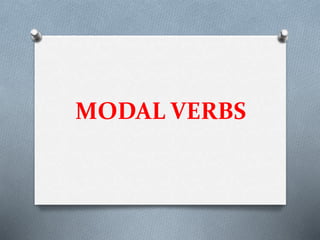Modal verbs
•Télécharger en tant que PPTX, PDF•
4 j'aime•13,684 vues
Modal Verbs
Signaler
Partager
Signaler
Partager

Recommandé
Recommandé
Contenu connexe
Tendances
Tendances (20)
Modals: can, could, may, might, should, have to, must

Modals: can, could, may, might, should, have to, must
En vedette
En vedette (20)
Similaire à Modal verbs
Similaire à Modal verbs (7)
Plus de Jesusquidiello
Plus de Jesusquidiello (20)
Parts of the day, days of the week, months, seasons

Parts of the day, days of the week, months, seasons
Dernier
Dernier (20)
PINTURA DEL RENACIMIENTO EN ESPAÑA (SIGLO XVI).ppt

PINTURA DEL RENACIMIENTO EN ESPAÑA (SIGLO XVI).ppt
RESULTADOS DE LA EVALUACIÓN DIAGNÓSTICA 2024 - ACTUALIZADA.pptx

RESULTADOS DE LA EVALUACIÓN DIAGNÓSTICA 2024 - ACTUALIZADA.pptx
TALLER DE DEMOCRACIA Y GOBIERNO ESCOLAR-COMPETENCIAS N°3.docx

TALLER DE DEMOCRACIA Y GOBIERNO ESCOLAR-COMPETENCIAS N°3.docx
Prueba de evaluación Geografía e Historia Comunidad de Madrid 2º de la ESO

Prueba de evaluación Geografía e Historia Comunidad de Madrid 2º de la ESO
SESION DE PERSONAL SOCIAL. La convivencia en familia 22-04-24 -.doc

SESION DE PERSONAL SOCIAL. La convivencia en familia 22-04-24 -.doc
BIOMETANO SÍ, PERO NO ASÍ. LA NUEVA BURBUJA ENERGÉTICA

BIOMETANO SÍ, PERO NO ASÍ. LA NUEVA BURBUJA ENERGÉTICA
EL HABITO DEL AHORRO en tu idea emprendedora22-04-24.pptx

EL HABITO DEL AHORRO en tu idea emprendedora22-04-24.pptx
ACERTIJO DE POSICIÓN DE CORREDORES EN LA OLIMPIADA. Por JAVIER SOLIS NOYOLA

ACERTIJO DE POSICIÓN DE CORREDORES EN LA OLIMPIADA. Por JAVIER SOLIS NOYOLA
2 REGLAMENTO RM 0912-2024 DE MODALIDADES DE GRADUACIÓN_.pptx

2 REGLAMENTO RM 0912-2024 DE MODALIDADES DE GRADUACIÓN_.pptx
La Sostenibilidad Corporativa. Administración Ambiental

La Sostenibilidad Corporativa. Administración Ambiental
Lecciones 05 Esc. Sabática. Fe contra todo pronóstico.

Lecciones 05 Esc. Sabática. Fe contra todo pronóstico.
Modal verbs
- 1. MODAL VERBS
- 2. ¿Qué es un verbo modal? O Los verbos modales son verbos que van delante de otros, ej: I play I can play O Añaden un matiz particular al significado del verbo: I play: (yo) juego I can play: (yo) puedo/ sé jugar (entendemos que hay posibilidades de que juegue o que tiene la capacidad de jugar a algo)
- 3. O Hay muchos verbos modales que ya conoces: can, must, could, have to, might, will, would, should, ... y cada uno se usa para aportar algún significado extra. O I can play can: poder> habilidad o posibilidad > Puedo jugar O I must play must: deber> obligación > Debo jugar O I should play should: debería> obligación muy suave o consejo > Debería jugar O I have to play have to: tener que> fuerte obligación > Tengo que jugar O I would play would: ( sin traducción ) > condición o potencialidad > Jugaría ( si ...) O etc...
- 4. ¿Cómo funcionan? O Son invariables, por eso ... She can dance (no se añade «s» con la 3ª persona del singular) O No necesitan do / does / did para las negativas o las interrogativas. O Para ponerlos en NEGATIVA se añade «not» detrás y ya está: We should not smoke ( cuidado con have to) O En las INTERROGATIVAS se intercambia con el sujeto Must you go? ( cuidado con have to) O No se pueden auxiliar unos a otros: I would can buy it ( usaríamos could)
- 5. ¿Qué significado aporta cada uno? O Habilidad: can / could I could run faster when I was younger. O Posibilidad: can / could / may / might It might snow in September. O Obligación: have to / must / should You have to carry your Identification Card. O Permiso: may / could / can May I come in, Mr Johnson? O Certeza: must It must be nine already. O Sugerencia / ofrecimiento: shall Shall I close the door? O Condicionalidad / potencialidad: would I would go if you invite me.
- 6. Con más detalle: O POSIBILIDAD: can / could / may / might poder / podría / podría / podría (en orden decreciente) Ejemplos: I can go tomorrow Puedo ir mañana I could go tomorrow Podría ir mañana I may go tomorrow Podría ir mañana ( pero es poco probable) I might go tomorrow Podría ir mañana ( pero es casi improbable)
- 7. O OBLIGACIÓN: have to / must / should tener que / tener que / deber / debería (en orden decreciente) Ejemplos: You have to drive carefully. Tienes que conducir con cuidado. You must carry your driving license with you. Debes llevar el carnet de conducir. You should but a new car. Deberías comprarte otro coche.
- 8. O PERMISO: may / could / can podría / podría / puedo (de más formal a menos formal) Ejemplos: May I add something to your remark? Podría añadir algo a su puntualización? Could I add something to your idea? Podría añadir algo a su idea? Can I add something to that? Puedo añadir algo a eso?
- 9. Verbo semimodal O Hay un verbo de los vistos anteriormente que no es propiamente MODAL sino SEMIMODAL porque a veces sigue otras reglas: HAVE TO Observa: She has to finish it ( cambia según el sujeto ) I don´t have to go ( no lleva «not» detrás ) Did you have to write it? ( no intercambia su sitio con el sujeto en las interrogativas )